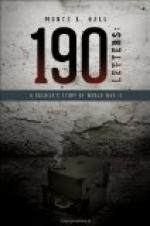If these notes should reach any one, may they give rise in an honest heart to horror of the foul crime of those responsible for this war. There will never be enough glory to cover all the blood and all the mud.
September 21, 1914.
War in rain.
It is suffering beyond what can be imagined. Three days and three nights without being able to do anything but tremble and moan, and yet, in spite of all, perfect service must be rendered.
To sleep in a ditch full of water has no equivalent in Dante, but what can be said of the awakening, when one must watch for the moment to kill or to be killed!
Above, the roar of the shells drowns the whistling of the wind. Every instant, firing. Then one crouches in the mud, and despair takes possession of one’s soul.
When this torment came to an end I had such a nervous collapse that I wept without knowing why—late, useless tears.
September 25.
Hell in so calm and pastoral a place. The autumnal country pitted and torn by cannon!
September 27.
If, apart from the greater lessons of the war, there are small immediate benefits to be had, the one that means most to me is the contemplation of the night sky. Never has the majesty of the night brought me so much consolation as during this accumulation of trials. Venus, sparkling, is a friend to me. . . .
I am now familiar with the constellations. Some of them make great curves in the sky as if to encircle the throne of God. What glory! And how one evokes the Chaldean shepherds!
O constellations! first alphabet!. . .
October 1.
I can say that, as far as the mind goes, I have lived through great days when all vain preoccupations were swept away by a new spirit.
If there should ever be any lapse so that only one of my letters reaches you, may it be one that says how beneficial, how precious have these torments been!
October 1 (from a note-book).
It follows from this that our suffering, every moment of it, should be considered as the most marvellous source of feeling and of progress for the conscience.
I now know into what domain my destiny leads me. No longer towards the proud and illusory region of pure speculation, but in the way of all little daily things—it is there that I must carry the service of an ever-vigilant sensibility.
I see how easily an upright nature may dispense with the arts of expression in order to be helpful in act and in influence. Precious lesson, which will enable me, should I return, to suffer less if fate no longer allows me to paint.
October 9.
It seems that we have the order to attack. I do not want to risk this great event without directing my thoughts to you in the few moments of quiet that are left. . . . Everything here combines to maintain peace in the heart: the beauty of the woods in which we live, the absence of intellectual complications. . . . It is paradoxical, as you say, but the finest moments of my moral life are those that have just gone by. . . .




